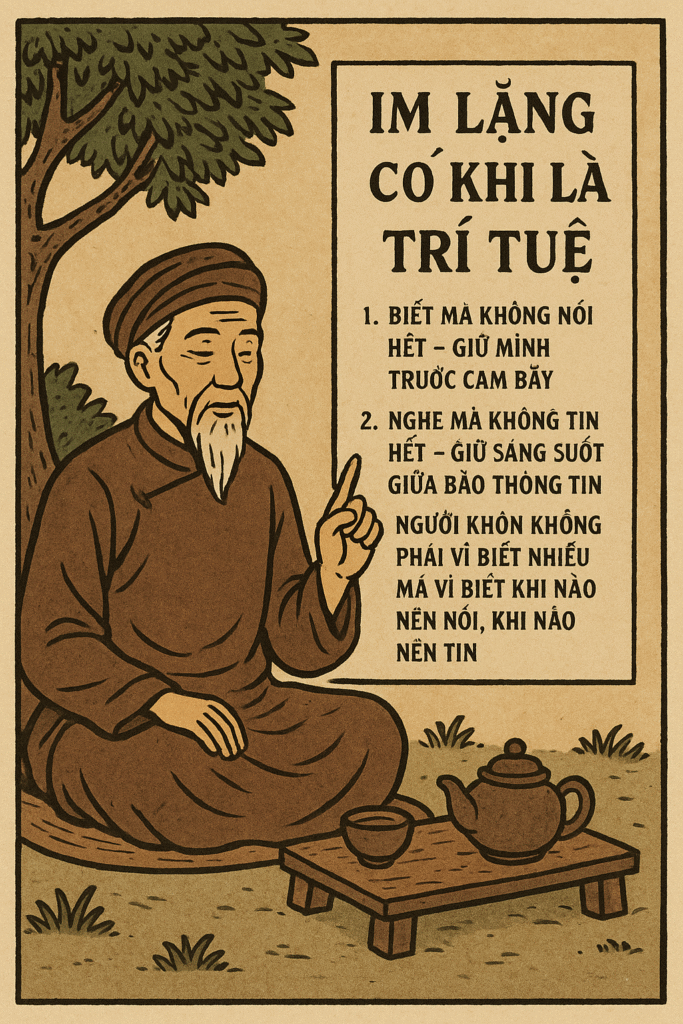In life, the more a person has cultivated their inner self, the less they speak. This silence isn’t due to a lack of knowledge; on the contrary, it’s a sign of profound understanding. They grasp that not everything one knows needs to be shared, and not everything one hears needs to be believed. The ancients said, “Tri vi tri, bat tri vi bat tri” (To know is to know, to not know is to not know). However, a deeper meaning lies in the fact that even when they “tri” (know), the wise know how to keep a part of it to themselves. At the same time, speech is both a means of communication and a weapon. Speaking in the right place brings benefits, while speaking carelessly brings harm. Therefore, holding back part of what could be said is a way to ensure safety for oneself and for relationships. Silence is not a sign of ignorance; it is an expression of careful selection and inner strength.
1. Speaking Everything You Know Invites Trouble
A person with inner cultivation understands that words carry weight and hidden dangers. Sharing everything you know is like exposing all your assets to the world. This not only makes you vulnerable to being exploited but can also unintentionally create unnecessary problems. Lao Tzu once said, “Duo yan shu qiong” (Many words eventually lead to failure). This emphasizes the need for caution in speech. The wise don’t hide their knowledge, but they know how to choose the right person and the right time to share it. They understand that a correct statement, if placed incorrectly, can have unforeseen consequences. The power of words sometimes lies in what is left unsaid, the pauses that give others time to reflect and show respect.
When you expose everything you know, you give leverage to others: you can be misunderstood, exploited, or unintentionally create enemies. The wise know to keep a part of their mental capital—they don’t show off all their wisdom or pour out all their feelings. It is this act of “holding back” that gives their spoken words weight; listeners respect them more because they sense the deliberation, not just idle chatter.
2. Believing Everything You Hear Makes You Easy to Manipulate
In the hustle and bustle of life, people’s words can be as sweet as honey or as sharp as a dagger. People often don’t need the truth; they just need an engaging story to spread. The ancients warned, “Ngôn bất quá kỳ, bất khả khinh tín” (Words without basis should not be easily believed). If we believe everything we hear without keeping a bit of skepticism, we can easily get caught up in pointless gossip and lose our own clarity. Being overly trusting can lead to being foolishly exploited. A person with inner cultivation is always alert, knowing how to filter what is worth hearing and having the courage to be skeptical of overly flowery words. This alertness is a “sixth sense” that helps them discern the truth.
The words of others can be sweet as honey or treacherous as a dagger. The ancients remind us: not everything you hear is true; a skeptical attitude is a necessary quality for self-preservation. If you believe everything, you can easily fall into schemes, let emotions override reason, and become a tool for others’ intentions. Therefore, listen but also scrutinize: who is speaking, why are they speaking, is there evidence, and is the timing appropriate? The ancients considered a cautious attitude when listening to be a form of self-control, helping to keep the mind clear and actions from being deceived.
3. Wisdom Is Not Measured by the Quantity of Knowledge
The wise person is not the one who knows a lot, but the one who knows when to speak and when to believe. To be silent when necessary is courage; to think before reacting is cultivation. Not speaking your entire mind is not being deceitful but is a way to protect yourself and maintain a safe space. Xunzi once said, “Ngôn chi bất văn, bất ngôn” (If what you say is not heard, do not speak). This not only shows humility but also respect for both the listener and yourself.
Wisdom is not about holding a lot of knowledge but about using that knowledge at the right time. Silence when needed is courage; thinking before responding is cultivation. The wise keep a “safe zone” for themselves: they don’t expose their entire inner world, they don’t blindly believe, and they don’t rush to judgment. As society gets louder and voices become emptier, discretion and alertness make a person less vulnerable and harder to predict. This is the art of self-preservation—not with weapons, but with inner wisdom.
In a world where people speak more than they think and hear more than they understand, the person who knows how to maintain discretion and alertness is the one who is the most difficult to predict and the least likely to be hurt. Discretion, caution, and alertness are the wisest forms of self-preservation. In this world, don’t expect everyone to be kind and sincere. Instead, equip yourself with discretion and alertness. A person who truly understands life often keeps a part of themselves silent and a part of themselves skeptical to live in peace and contentment.


ARTICLES IN THE SAME CATEGORY
Spring Pilgrimages and Early Year Temple Visits: Preserving the Cultural Soul of Vietnam Amid Modern Spiritual Distortions
Why Donald Trump is Repealing the “Endangerment Finding”: Where Will Humanity Go if Earth Exceeds Its Limits?
Copper is emerging as a strategic metal that superpowers will compete fiercely for.
The Epstein Files and the Shadow of Power: When Dark Rumors Reflect Back Through Cinema
The More You Boast, the Cheaper Your Value Becomes
2026 Lunar New Year Holiday Schedule – Year of the Fire Horse – VietNam
ARTICLES IN THE SAME GENRE